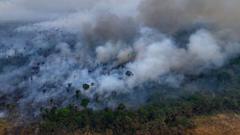Satellite analysis shows that 67,000 sq km of tropical forests were lost last year, predominantly due to fires exacerbated by climate change, leading scientists to warn of potential ecosystem collapse.**
Record Deforestation Rates Threaten Tropical Forests Amid Climate Change**

Record Deforestation Rates Threaten Tropical Forests Amid Climate Change**
New data reveals unprecedented loss of tropical forests in 2024, driven by fires and extreme weather, raising alarms about climate resilience.**
The latest satellite analysis has unveiled alarming data regarding the world’s tropical forests, indicating that their destruction has reached the fastest rate ever documented last year. Researchers estimate that approximately 67,000 square kilometers of these vital ecosystems vanished in 2024, an area comparable to the size of the Republic of Ireland, translating to approximately 18 football pitches lost every minute.
This unprecedented loss is largely attributed to wildfires, which have overtaken agricultural land clearances as the primary cause for deforestation for the first time. The Amazon rainforest, in particular, has been severely affected, struggling under the weight of the worst drought recorded, influenced by climate change alongside the natural climatic shifts associated with the El Niño phenomenon.
Despite the grim statistics on forest loss, there is a glimmer of hope in Southeast Asia, where governmental initiatives have led to a reduction in deforestation rates. Encouragingly, the area of primary forest lost in Indonesia fell by 11% compared to the previous year due to enhanced enforcement of "no burning" laws, demonstrating that concerted political will can lead to positive environmental outcomes.
Globally, the alarming trend prompts a re-evaluation of the resilience of tropical forests in the face of a warming climate. Experts, including Professor Matthew Hansen of the University of Maryland’s GLAD lab, express concerns that some forests may be nearing a “tipping point” that could lead to a permanent ecological shift from dense rainforests to savanna. Such a transition would not only severely impact biodiversity but could also have dire consequences for the climate globally.
The record loss of these old-growth forests has released an estimated 3.1 billion tonnes of carbon dioxide into the atmosphere, a figure comparable to the annual emissions of the entire European Union.
Climate advocates emphasize the critical need for sustained forest protection efforts, with the upcoming UN climate summit COP30 in the Amazon viewed as a pivotal moment for establishing effective conservation strategies. Innovative proposals, such as compensating countries that effectively conserve their forests, are being discussed to make the preservation of these vital ecosystems more financially attractive than their destruction.
As fires become increasingly intense and widespread, experts warn that immediate and consistent action is vital to safeguard the remaining tropical forests, stressing that the fight to preserve the environment must be relentless and enduring.





















